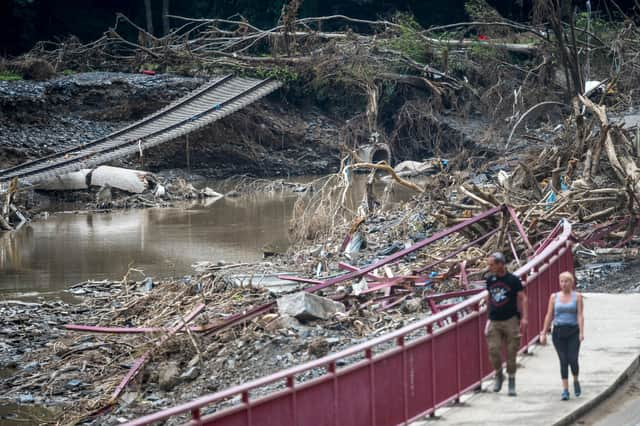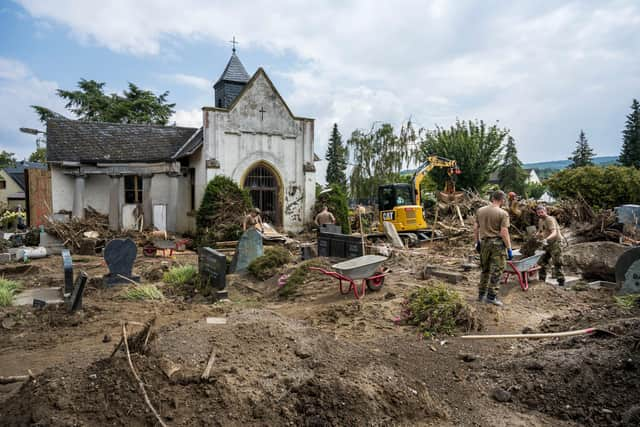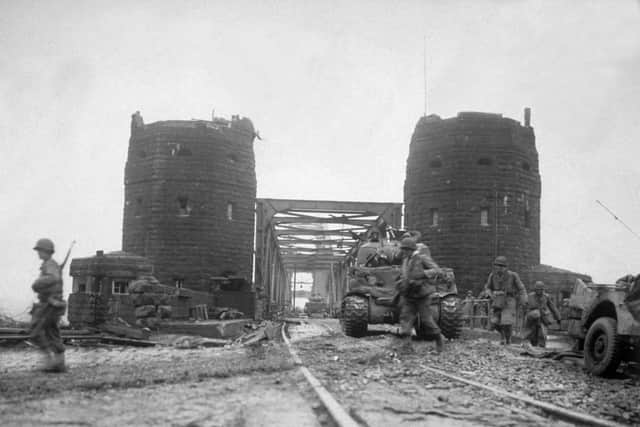Climate change: With time running out, Scottish government needs Greens at its heart to bring a sense of urgency – Ross Greer MSP


Small villages dot a landscape of forested hills east of the River Rhine, many of their buildings having stood since the main town, Bad Neuenahr-Ahrweiler was razed to the ground after a siege in 1689. Some may know it from the World War Two battle made famous by the classic action flick, The Bridge at Remagen.
Not since 1945 had Ahrweiler been blighted by widespread destruction.
Advertisement
Hide AdAdvertisement
Hide AdIn July, over the course of little more than a day, Bad Neuenahr-Ahrweiler was almost completely submerged by unprecedented flash floods. One hundred and thirty-five people died out of a population slightly smaller than that of Dundee. Some are still missing more than a month later.
Earlier this week scientists from the World Weather Attribution Service confirmed what many had said at the time, this was the climate crisis in action. The extent to which human activity has warmed the planet since the industrial revolution made such flooding anything up to 900 per cent more likely.
Europe’s summer of climate catastrophe is far from over. While hundreds were killed by the floods in Germany and Belgium, thousands more have been forced to flee their homes by wildfires raging across Greece and Turkey. The property damage caused so far stands in excess of €10 billion.
It is a painful realisation but one we cannot ignore, this is our new normal. As UN Secretary-General António Guterres warned last week, the latest scientific report by the Intergovernmental Panel on Climate Change was “code red for humanity”. Without bold action, things will get much worse, much quicker.


For those of us in politics there are two questions; what are we doing about it, and will that be enough?
For those my age and younger there is a third, more sobering personal thought; will all of our adult lives be defined by this deepening crisis, or is there a way out?
The Scottish Greens and the SNP recognise this as a time for politicians to get out of our comfort zones, to do things differently and to cooperate in the interests of people and planet. That’s why we spent the summer engaged in negotiations for a new kind of government, one which will put tackling the climate emergency at the top of its agenda.
The results of those negotiations were published last week. If approved by Green members this weekend, our shared policy programme would deliver by far the greenest governing agenda ever seen on these islands.


Advertisement
Hide AdAdvertisement
Hide AdFrom transport to housing to energy, the actions contained in the agreement match the scale of the crisis we face.
Some £5 billion will be spent over five years improving and expanding our railways, including to communities who currently have no access to the rail network. Living on the least reliable line in Scotland (the Milngavie suburban), I know what a difference this investment will make.
The ‘active travel’ budget for walking, wheeling and cycling improvements will almost triple to £320 million a year.
And a new Community Bus fund will be introduced, making it easier for local councils to use their new powers to bring bus services back into public ownership.
Just as important as what we will do is what we’ll stop. There will be no new major road building work beyond the projects too far down the line to stop, such as the A9 and the small number which are genuinely essential, such as improving the Rest and Be Thankful. After decades of non-stop, shockingly expensive road expansion, this is a major and long-overdue shift in priorities.
This package of measures is essential to Scotland’s climate ambitions. While emissions have decreased across almost every other sector, transport emissions are rising. More people were driving and fewer using public transport, even before the pandemic.
When combined with existing initiatives such as free bus travel for under 22s (starting January 31, a result of previous Green budget negotiations), these measures will make public transport and active travel easier, more accessible, safer and more affordable.
We know that the climate crisis won’t be solved by lecturing people into changing their lifestyles. The transformation we need can only come about when governments make big, bold changes which benefit both people and planet.
Advertisement
Hide AdAdvertisement
Hide AdThat same principle underpins the game-changing housing and energy efficiency measures we have agreed; £1.8billion will be spent to ensure buildings from homes to schools to hospitals use less energy, are warm and get their heat from renewable rather than fossil fuel sources.
Not only will this dramatically reduce energy consumption and thus carbon emissions, it will lift thousands of families out of fuel poverty, free up millions of pounds otherwise spent on heating public buildings and create tens of thousands of quality jobs at exactly the moment our economy really needs them.
And the job creation does not stop there. We are going to double Scotland’s onshore wind capacity and put far greater emphasis on a domestic supply chain, creating manufacturing jobs here rather than shipping in turbine jackets and the like from across the world.
Businesses looking for government support, whether financial or otherwise, will have to demonstrate how they are helping to tackle rather than cause the climate crisis. They’ll also need to meet strengthened fair-work requirements such as paying a real Living Wage.
Our climate is less than a decade from its tipping point. We will be judged for a long time to come by the actions we take right now.
In May, the Scottish Greens asked the public to vote like our futures depend on it. Today our members will have the chance to bring that urgency to the heart of government. This is our first opportunity to enter government, but it will also be our last before that planetary tipping point. We have a moral obligation to rise to the challenge.
Ross Greer is Scottish Green Party MSP for West Scotland
A message from the Editor:
Thank you for reading this article. We're more reliant on your support than ever as the shift in consumer habits brought about by coronavirus impacts our advertisers.
If you haven't already, please consider supporting our trusted, fact-checked journalism by taking out a digital subscription.
Comments
Want to join the conversation? Please or to comment on this article.
